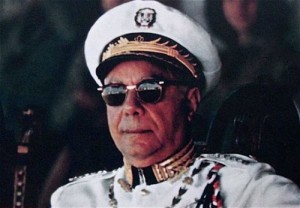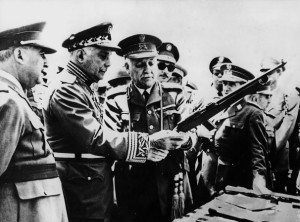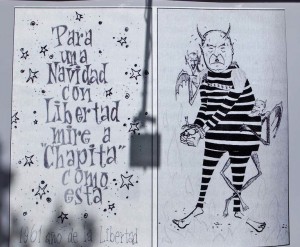Lifestyle in the DR at the time was very traditional. Girls like me were greatly protected by the adults. And the adults were extremely secretive. As an adult today, I can describe the environment as oppressive. There were a lot of social restraints that were imposed. I recall being a student in religious school, marching and being a part of political parades in the street. I still remember my uniform. You were essentially told how to behave, what to say and essentially not to speak very much.

Dictator Rafael Trujillo ruled as a dictator of the Dominican Republic from 1930 until his assassination in 1961.
(Image Source: TheStar.com)
We were under the dictatorship of Rafael Trujillo prior to that. While it seemed like there was a great deal of order, there was an undercurrent of distrust because it was a dictatorship that was running the country. I just remember the secretiveness that went on when there were political comments being made. We had no TV of course, but it was a radio; you had to be careful what radio stations you listened to. You cannot have listened to radio stations coming from Cuba, for example.
 And there was no discussion with children about any of this. We just witnessed it. We would witness the things being said behind closed doors, comments about how we only had one political party in the country. Somehow I don’t remember anything about elections, but there must have been elections and it was always for the same person—the dictator. But children would never be part of that. We would be told to hush because if a comment or anything was being repeated, we would be in big trouble. And there was a very strong military presence in the environment that I was in, so my memories clutter with generals and medals and all of that you would witness, and very rigid kind of political behavior.
And there was no discussion with children about any of this. We just witnessed it. We would witness the things being said behind closed doors, comments about how we only had one political party in the country. Somehow I don’t remember anything about elections, but there must have been elections and it was always for the same person—the dictator. But children would never be part of that. We would be told to hush because if a comment or anything was being repeated, we would be in big trouble. And there was a very strong military presence in the environment that I was in, so my memories clutter with generals and medals and all of that you would witness, and very rigid kind of political behavior.

Sentiments after Rafael Trujillo (El Jefe) was assassinated in 1961 after 31 years of a brutal dictatorship over the Dominican Republic. Image taken in Parque Independencia, Santo Domingo.
(Image Source: Flickr.com)
In 1961, once Trujillo was assassinated, everyone knew. It was on the radio. My mother’s family and my brothers were related to university students (who were cousins). The military decided that university students were an insurgence at that time so they assassinated and jailed many of them. So within that year, a tremendous amount of persecution went on: a lot of people were disappearing and dying—there were all sorts of unexplained deaths, bodies would be found on the streets… That had already been going on before Trujillo was assassinated and there would be talk of it, but you didn’t actually witness the unrest. After the assassination, we witnessed the unrest as children. A lot of people were running in the streets and hiding from the generals and military. And I remember my home being ransacked: they came in—you couldn’t say no—and checked everything and turned things upside down and the adults couldn’t say anything.
